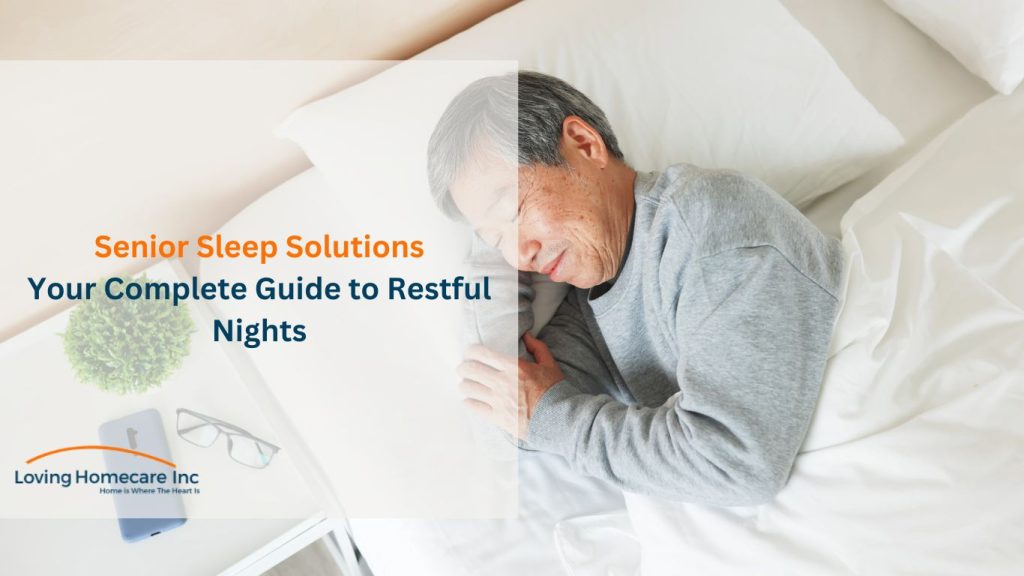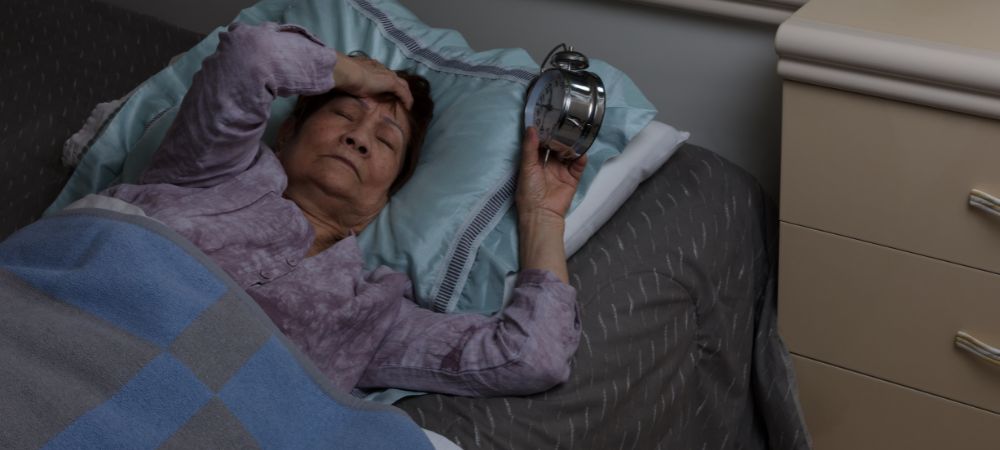Recently updated on June 25th, 2024 at 10:51 am
As we age, the importance of quality sleep becomes increasingly evident. Sleep is a luxury and a vital component of overall health and well-being, particularly for elderly individuals. Yet, for many seniors, achieving restful nights can be elusive due to a variety of factors. In this comprehensive guide, specifically designed for elderly individuals, caregivers, and healthcare professionals, we’ll delve into the significance of sleep for older people and explore common sleep issues they face. Moreover, we’ll discuss effective sleep aids tailored to their needs, including the best natural sleep aid for elderly individuals and safe over-the-counter options.
Understanding Sleep Challenges in the Elderly
 Factors contributing to poor sleep in older age
Factors contributing to poor sleep in older age
- Changes in Circadian Rhythms: As we age, our internal body clock, known as the circadian rhythm, may shift, leading to difficulties in falling asleep and staying asleep through the night.
- Health Conditions: Chronic conditions such as arthritis, heart disease, and respiratory disorders can cause discomfort and pain, disrupting sleep patterns. Additionally, neurological conditions like Alzheimer’s disease can affect sleep-wake cycles.
- Medications: Many medications prescribed for common age-related ailments can have side effects that interfere with sleep. These may include diuretics, beta-blockers, and antidepressants.
- Psychological Factors: Stress, anxiety, and depression are prevalent among older people and can significantly impact sleep quality. Moreover, life transitions such as retirement or losing a loved one may contribute to sleep disturbances.
Impact of sleep disorders on health and well-being
- Increased Risk of Health Problems: Chronic sleep deprivation in the elderly is associated with a higher risk of developing serious health issues, including cardiovascular disease, diabetes, and cognitive decline.
- Impaired Cognitive Function: Poor sleep can impair cognitive function and memory consolidation, leading to difficulties in concentration, problem-solving, and decision-making.
- Mood Disturbances: Sleep disorders can exacerbate symptoms of depression and anxiety, further impacting overall mental health and well-being.
Given the profound effects of sleep disturbances on elderly individuals, finding effective sleep aids tailored to their needs is crucial. We encourage you to consult with a healthcare professional to discuss the best options for your specific situation.
For seniors seeking natural alternatives, we assure you that the safest sleep aids for older adults are elderly home care favours, herbal supplements such as valerian root and chamomile, sleep aids for elderly figures, and melatonin. These may offer relief without the risk of dependency or adverse side effects commonly associated with prescription sleep medications. Additionally, establishing a relaxing bedtime routine, maintaining a consistent sleep schedule, and creating a conducive sleep environment can promote better sleep quality.
For those considering over-the-counter options, choosing products specifically formulated for older people and consulting with a healthcare professional to ensure safety and efficacy is essential. Options such as diphenhydramine or doxylamine-based sleep aids may be suitable for short-term use, but caution should be exercised due to potential side effects, particularly in older adults.
Natural Remedies
 Best natural sleep aids for elderly people encompass a range of herbs, supplements, and lifestyle adjustments to promote restful sleep without prescription medications. Here’s a breakdown of some commonly utilized natural remedies:
Best natural sleep aids for elderly people encompass a range of herbs, supplements, and lifestyle adjustments to promote restful sleep without prescription medications. Here’s a breakdown of some commonly utilized natural remedies:
- Herbal Supplements: Certain herbs have been traditionally used to aid sleep and relaxation. Examples include valerian root, which may help reduce the time it takes to fall asleep and improve sleep quality, and chamomile, known for its calming properties. Other herbs like passionflower and lemon balm are also thought to have mild sedative effects.
- Melatonin: Melatonin is a hormone naturally produced by the body to regulate sleep-wake cycles. Supplementing with melatonin may benefit elderly individuals experiencing disruptions in their sleep patterns, such as difficulty falling asleep or jet lag.
- Lifestyle Changes: Implementing lifestyle modifications can also support better sleep quality. This includes establishing a regular sleep schedule, creating a relaxing bedtime routine, minimizing caffeine and alcohol intake, and ensuring a comfortable sleep environment with appropriate lighting and temperature.
The benefits of natural sleep aids for older adults include their gentle approach to addressing sleep issues, reduced risk of dependency or adverse side effects, and compatibility with other medications. However, it’s essential for individuals to consult elderly home care with a healthcare provider before starting any new supplement regimen, especially if they have underlying health conditions or are taking other medications.
Over-the-Counter Options
Over-the-counter (OTC) sleep aids are readily available without a prescription and are often chosen for their convenience and accessibility. For elderly individuals requiring overnight care or elder home care, OTC sleep aids can be particularly useful. Here are some popular options:
- Diphenhydramine: This antihistamine is commonly found in OTC sleep aids and reduces drowsiness. It can help elderly individuals fall asleep faster but may cause drowsiness the next day and can be associated with side effects such as dry mouth and constipation.
- Doxylamine: Similar to diphenhydramine, doxylamine is an antihistamine with sedative properties. It’s often included in OTC sleep medications and can be effective for short-term use. However, caution should be exercised due to potential side effects, especially in older adults.
- Combination Products: Some OTC sleep aids contain a combination of ingredients, such as pain relievers and sleep aids, to address both sleep disturbances and accompanying discomfort. These products should be used judiciously, as they may interact with other medications and can pose risks for elderly individuals with certain health conditions.
While OTC sleep aids can be beneficial for occasional use or short-term insomnia, they may not address the underlying causes of sleep disturbances. They should be considered as a short-term solution. Additionally, elderly individuals should be cautious when using these products, as they may be more sensitive to side effects and drug interactions.
Safety considerations are paramount when addressing sleep issues in the elderly, particularly when considering the use of sleep aids. We emphasize that consulting healthcare professionals is not just important, but of utmost importance. Their role in providing personalized guidance ensures that the chosen approach is safe and appropriate for individual needs. Here’s why:
- Individualized Assessment: Healthcare professionals can conduct a comprehensive assessment of the elderly individual’s health status, medical history, and current medications to identify any underlying conditions or potential contraindications that may impact the choice of sleep aids.
- Risk of Adverse Effects: Certain sleep aids, especially over-the-counter medications, carry the risk of side effects such as drowsiness, confusion, dizziness, and interactions with other medicines. Elderly individuals may be more susceptible to these effects due to age-related changes in metabolism and sensitivity to drugs.
- Drug Interactions: Many elderly individuals take multiple medications to manage various health conditions, increasing the risk of drug interactions with sleep aids. Healthcare professionals can assess potential interactions and recommend safe alternatives to minimize risks. Top of Form
Conclusion:
In conclusion, addressing sleep issues in older people requires a multifaceted approach that considers both natural remedies and pharmacological interventions. By understanding the factors contributing to poor sleep and the potential consequences of untreated sleep disorders, we can better support the sleep health and overall well-being of elderly individuals. Both natural remedies and OTC sleep aids offer options for elderly individuals seeking relief from sleep issues. However, it’s essential to weigh the benefits and considerations of each approach and to consult with a healthcare professional to determine the most appropriate course of action for individual needs and circumstances, especially in the context of overnight elderly care or elderly home care.
When addressing sleep issues in older people, it’s essential to prioritize safety and consult with healthcare professionals for personalized guidance. Natural remedies such as herbal supplements and lifestyle adjustments offer gentler alternatives with fewer risks of adverse effects, but they still require careful consideration and monitoring. Over-the-counter sleep aids can provide short-term relief but should be used judiciously and under the guidance of a healthcare provider, especially in the context of overnight elderly care or elder home care. By taking a proactive and informed approach, we can ensure that elderly individuals receive the support they need to achieve restful nights and maintain optimal health and well-being. Consider loving homecare as a vital part of this support system.


 Factors contributing to poor sleep in older age
Factors contributing to poor sleep in older age